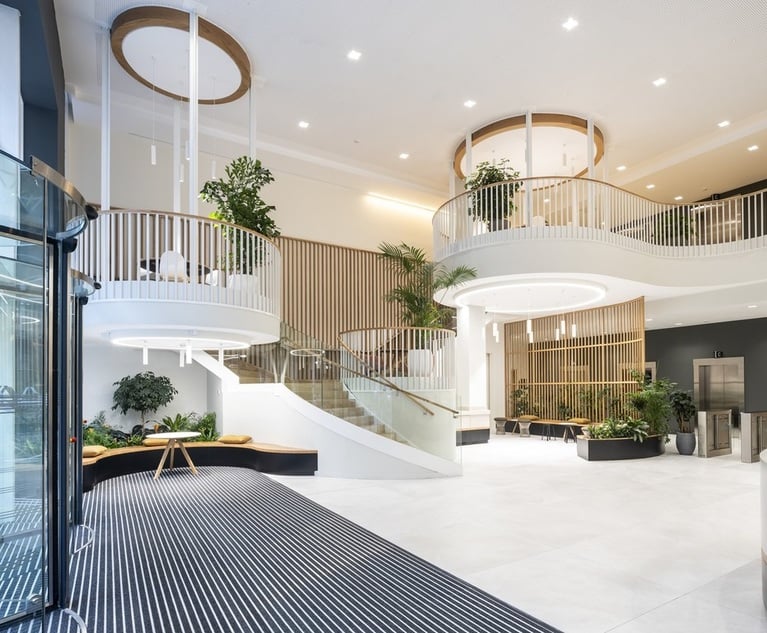Insurance firm Parabis owed creditors £121m when it collapsed
Administrators report reveals the extent of the firm's liabilities and what went wrong prior to its collapse in November
January 06, 2016 at 05:08 AM
4 minute read
Insurance law firm Parabis owed creditors £121m when it collapsed and entered into administration last November, an accountants report reveals.
According to a report by administrators AlixPartners, secured creditors of the Parabis group are owed £73.4m, and unsecured creditors are owed £47.5m.
Secured creditors, largely made up of the firm's banks, stand to receive approximately £32.5m after the costs of the administration are taken into account, leaving them £40m out of pocket.
The secured lending syndicate includes Lloyds Banking Group which is owed £16.7m and Royal Bank of Scotland which is owed £8.8m.
Unsecured creditors stand to receive less than 2% of the money they are owed leaving them with a loss of around £46.6m.
According to the report Parabis has more than 2,500 unsecured creditors.
Unsecured creditors include King & Wood Mallesons, which is owed £249,431; Capita Medical Reporting, which is owed £2.58m; call centre provider Webhelp UK, which is owed £462,970; Leeds City Council, which is owed £97,874; and publisher LexisNexus UK which is owed £103,676.
A significant number of barristers are among the unsecured creditors including Christopher Bamford of Tanfield Chambers who is owed £58,493, Paul Russell QC of 12 King's Bench Walk who is owed £52,215, Simon Wilton of Hailsham Chambers who is owed £47,059 and Quintin Fraser of 39 Essex Street Chambers who is owed £66,967.
In addition to the £121m owed to creditors Parabis also had loan notes worth £43.2m from private equity firm Duke Street, £23.9m of vendor loan notes and £43.1m of management loan notes.
Causes of the collapse
The report said that regulatory changes, a poor understanding of the commercial implications of Alternative Business Structures (ABSs), buying other businesses at the top of the market and a lack of integration were key factors in the collapse of Parabis.
Parabis acquired insurance law firm Everatts Solicitors in 2011 and personal injury firm Greenwoods in 2013, when the personal injury market was booming in an attempt to widen Parabis's insurer client base. However, after the purchases, two major insurers moved significant volumes of work to other firms, which led to a loss of "talented fee earners".
The report also said the firms acquired were not well-integrated into the wider group, with separate accounting and case management systems, which led to inefficiencies.
The introduction of the Legal Aid, Sentencing and Punishment of Offenders Act 2012 (LASPO) – which banned firms from paying for referrals – and the Ministry of Justice's fixed fee regime, hit the firm's claimant business with revenue per case falling from an average £2,300 per case to £850.
In response to the regulatory changes, the firm established ABS joint ventures with its key clients Saga, Direct Line Insurance Group (DLG) and RSA. However, the lack of leverage on pricing with the insurer clients meant that the profitability of work fell from approximately £250 per case to below £50.
These issues led to increased financial pressure, which the management responded to with aggressive cost cutting. Annualised costs of approximately £13m were removed from the group's costs base during the 2014 financial year.
However, by June 2015 it became clear that Parabis would be unlikely to continue to trade beyond the medium term and AlixPartners Corporate Finance was engaged on 17 June 2015 to sell all or part of the group.
Sell off
In November, the Parabis group entered a pre-pack administration and was split up and sold off.
A management group, which included Plexus senior partner Tim Roberts, and partners Nick Addyman, Andrew McDougall and former partner and founder Tim Oliver, bought part of the group under the name Plexus Law.
DLG acquired the ABS it had set up with Parabis following the group's collapse for the nominal sum of £1. Approximately 150 lawyers who had been a part of that group transferred over to DLG.
According to the report Plexus Law paid a total of £2.25m initial consideration with an estimated £6.5m deferred consideration.
This content has been archived. It is available through our partners, LexisNexis® and Bloomberg Law.
To view this content, please continue to their sites.
Not a Lexis Subscriber?
Subscribe Now
Not a Bloomberg Law Subscriber?
Subscribe Now
NOT FOR REPRINT
© 2025 ALM Global, LLC, All Rights Reserved. Request academic re-use from www.copyright.com. All other uses, submit a request to [email protected]. For more information visit Asset & Logo Licensing.
You Might Like
View All
King & Spalding, Weil, Gotshal & Manges Launch Pro Bono Legal Initiative for Tennis Players
2 minute read

Clifford Chance Among Advisers as Prince Harry Newspaper Hearing Begins
3 minute read
Trending Stories
- 1Uber Files RICO Suit Against Plaintiff-Side Firms Alleging Fraudulent Injury Claims
- 2The Law Firm Disrupted: Scrutinizing the Elephant More Than the Mouse
- 3Inherent Diminished Value Damages Unavailable to 3rd-Party Claimants, Court Says
- 4Pa. Defense Firm Sued by Client Over Ex-Eagles Player's $43.5M Med Mal Win
- 5Losses Mount at Morris Manning, but Departing Ex-Chair Stays Bullish About His Old Firm's Future
Who Got The Work
J. Brugh Lower of Gibbons has entered an appearance for industrial equipment supplier Devco Corporation in a pending trademark infringement lawsuit. The suit, accusing the defendant of selling knock-off Graco products, was filed Dec. 18 in New Jersey District Court by Rivkin Radler on behalf of Graco Inc. and Graco Minnesota. The case, assigned to U.S. District Judge Zahid N. Quraishi, is 3:24-cv-11294, Graco Inc. et al v. Devco Corporation.
Who Got The Work
Rebecca Maller-Stein and Kent A. Yalowitz of Arnold & Porter Kaye Scholer have entered their appearances for Hanaco Venture Capital and its executives, Lior Prosor and David Frankel, in a pending securities lawsuit. The action, filed on Dec. 24 in New York Southern District Court by Zell, Aron & Co. on behalf of Goldeneye Advisors, accuses the defendants of negligently and fraudulently managing the plaintiff's $1 million investment. The case, assigned to U.S. District Judge Vernon S. Broderick, is 1:24-cv-09918, Goldeneye Advisors, LLC v. Hanaco Venture Capital, Ltd. et al.
Who Got The Work
Attorneys from A&O Shearman has stepped in as defense counsel for Toronto-Dominion Bank and other defendants in a pending securities class action. The suit, filed Dec. 11 in New York Southern District Court by Bleichmar Fonti & Auld, accuses the defendants of concealing the bank's 'pervasive' deficiencies in regards to its compliance with the Bank Secrecy Act and the quality of its anti-money laundering controls. The case, assigned to U.S. District Judge Arun Subramanian, is 1:24-cv-09445, Gonzalez v. The Toronto-Dominion Bank et al.
Who Got The Work
Crown Castle International, a Pennsylvania company providing shared communications infrastructure, has turned to Luke D. Wolf of Gordon Rees Scully Mansukhani to fend off a pending breach-of-contract lawsuit. The court action, filed Nov. 25 in Michigan Eastern District Court by Hooper Hathaway PC on behalf of The Town Residences LLC, accuses Crown Castle of failing to transfer approximately $30,000 in utility payments from T-Mobile in breach of a roof-top lease and assignment agreement. The case, assigned to U.S. District Judge Susan K. Declercq, is 2:24-cv-13131, The Town Residences LLC v. T-Mobile US, Inc. et al.
Who Got The Work
Wilfred P. Coronato and Daniel M. Schwartz of McCarter & English have stepped in as defense counsel to Electrolux Home Products Inc. in a pending product liability lawsuit. The court action, filed Nov. 26 in New York Eastern District Court by Poulos Lopiccolo PC and Nagel Rice LLP on behalf of David Stern, alleges that the defendant's refrigerators’ drawers and shelving repeatedly break and fall apart within months after purchase. The case, assigned to U.S. District Judge Joan M. Azrack, is 2:24-cv-08204, Stern v. Electrolux Home Products, Inc.
Featured Firms
Law Offices of Gary Martin Hays & Associates, P.C.
(470) 294-1674
Law Offices of Mark E. Salomone
(857) 444-6468
Smith & Hassler
(713) 739-1250








